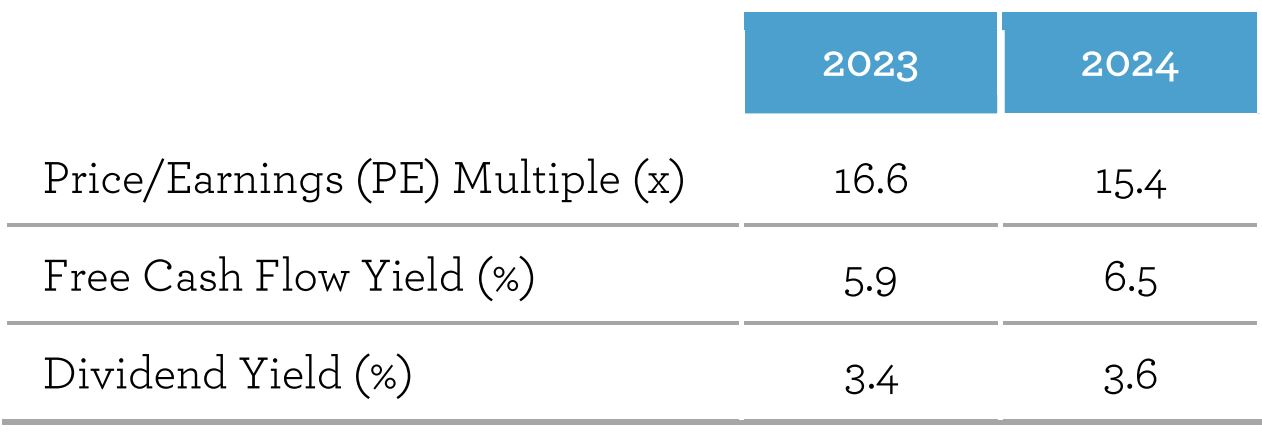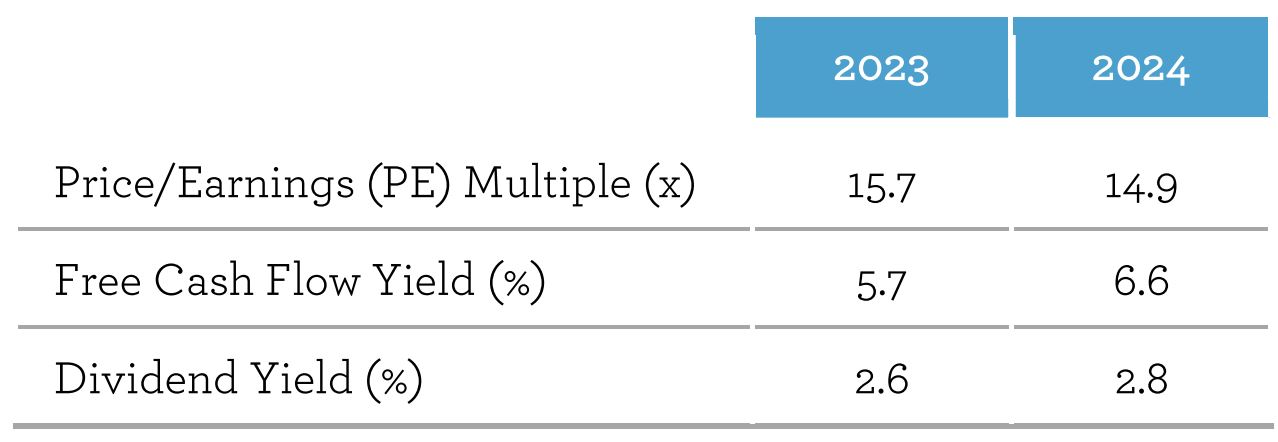October was a tough month, as investors continued to digest higher interest rates and bond yields, and a slowing global economy (though data out of the US economy has thus far held up better than most expected). The tragic developments in Israel and Palestine also impacted sentiment and served as a reminder that geopolitical risks remain an unneglectable part of the backcloth. On the positive side of the ledger, inflationary pressures continued to ease, and central banks in the UK, US and EU suggested that interest rates may now be at (or very close to) their peaks for this cycle. Though the operational backdrop remains challenging and complex, many companies also continue to report resilient results, and valuation opportunities are as attractive and broad as they have been for some time.
Since the start of the year, Evenlode Income has risen +0.4% compared to a rise of +0.3% for the FTSE All-Share and a fall of -2.5% for the IA UK All Companies sector[i].
Cash generation and self-funding compounding
Last month I discussed the return to an ‘old normal’ level of interest rates and its implications. From a fundamental perspective, financing risk is key. Leveraged business models come under strain at higher costs of capital, as do businesses that aren’t self-funders and therefore need to rely on fresh debt or equity issuance to operate and grow. The highly cash generative, self-funding nature of the portfolio is a great comfort in this context, as are the strong balance sheets of the underlying holdings[ii].
Elements of healthy catharsis
Though it clearly comes with risk, the reversion of interest rates over recent months also has a healthy and cathartic element, as several years of accumulated froth is blown off financial markets. Well-run companies with sensible capital structures should benefit - the strong grow stronger when the cost of capital stands at more normal levels. There will be opportunities to take market share from weaker and more leveraged competitors, and to make bolt-on acquisitions at more attractive values as private equity activity recedes (companies such as Bunzl and Diploma are already beginning to comment on this). In the stock market, a broader set of opportunities are also now in play. The share prices of many quality companies that were highly valued at the end of 2021 (when interest rates were at practically zero) have subsequently sold off and derated significantly (now that interest rates are over 5%).
Third quarter results
More than half of portfolio holdings have now reported third quarter results, with average organic revenue growth running at +5% year-on-year. The current forecast for full year organic revenue growth is about +6%, with margin expansion driving profit growth at a slightly higher rate[iii]. This theme, of slowing revenue growth combined with the silver lining of lower input cost inflation, is one that we have heard from a wide range of companies.
To finish, below is a brief update on two portfolio companies that we mentioned briefly last month. They give a flavour of the valuation and compounding opportunities we see in self-funding, market-leading businesses across a variety of sectors. Next month we will give a fuller round-up of recent results.
Reckitt Benckiser
Source: Evenlode, FactSet
Reckitt is a market leader in health and hygiene categories globally, with a strong portfolio of brands and an attractive geographic footprint that includes 35% of sales from faster-growing emerging markets. It has been a powerful compounding company over the longer-term, but performance has been more pedestrian over the last five years. Organic sales have in fact been strong, growing +7% per annum between 2019 and 2023. A big step up in investment though, has meant that earnings have only grown slightly. This heavy investment has been made to address past underinvestment in certain areas and drive future growth.
Reckitt was a fashionable stock five years ago, and we had nearly exited the position for valuation and dividend reasons back in 2017. Since then, earnings have underwhelmed, Covid has created unusual operational volatility and investors have got bored and moved onto other things. The stock has derated significantly and reflecting both this significantly improved valuation and a better-invested business, Reckitt is back in the portfolio’s top ten positions.
Incoming CEO Kris Licht’s stated priority is to return Reckitt to a ‘boringly stable company’ - an admirable aim in our view. Management’s medium-term guidance is for mid-single-digit organic revenue growth and earnings growth a little above this rate. Given Reckitt’s current valuation, the potential for compelling compound returns is available, whilst you are paid a more than 3% dividend yield along the way.
Spectris
Source: Evenlode, FactSet
Spectris is a global leader in precision measurement equipment and software. It sells into structurally growing end-markets including pharmaceuticals, semiconductors, and machine manufacturing. Like Reckitt and many other businesses in the portfolio, Spectris has had a lot to cope with over the last few years - Covid, geopolitics, input cost inflation and more. Spectris has continued to produce solid results, though, as evidenced by a 33rd year of continuous dividend growth in 2022. Management have also continued to invest through the challenges, with research and development expenditure now, as a percentage of sales, a third higher than it was pre-pandemic. This is driving a strong pipeline of new product launches. Growth opportunities are wide-ranging for Spectris, including interesting exposure to life sciences and the structural shift towards the ‘electrification of everything’.
At its third quarter trading update this week, Spectris guided to organic revenue growth of +10% and earnings growth at a higher level. The company has a very strong balance sheet, with more than £160m of net cash. Over the medium-term, management is aiming to grow organic revenue at a good rate (+6-7% per annum) with earnings growth at a higher level.
Quality compounding value
Discussing these companies won’t make you the most exciting person at the cocktail party, and unlike recently ‘hot’ areas of the market such as oil and large US technology stocks their share prices have been stuck in the doldrums over recent months. But they are quality, cash compounding companies that are attractively valued both in absolute terms and relative to their long-term histories[iv]. More generally, we are quietly excited by the combination of quality and value that we see across both the portfolio and the fund’s broader investable universe.
Hugh, Chris M, Ben P. and the Evenlode team
1 November 2023





